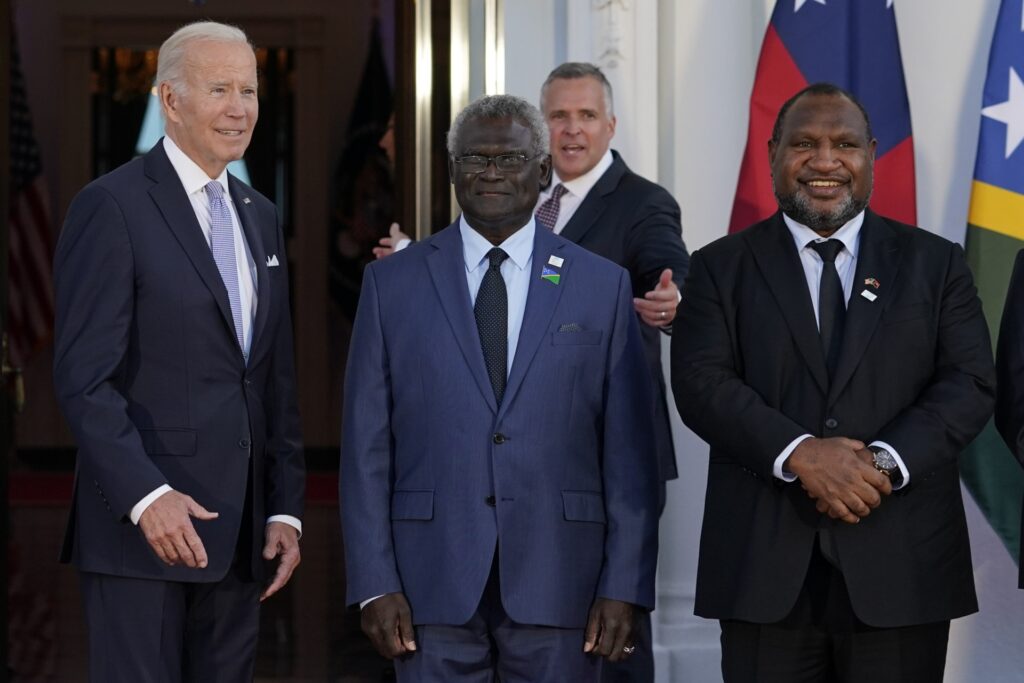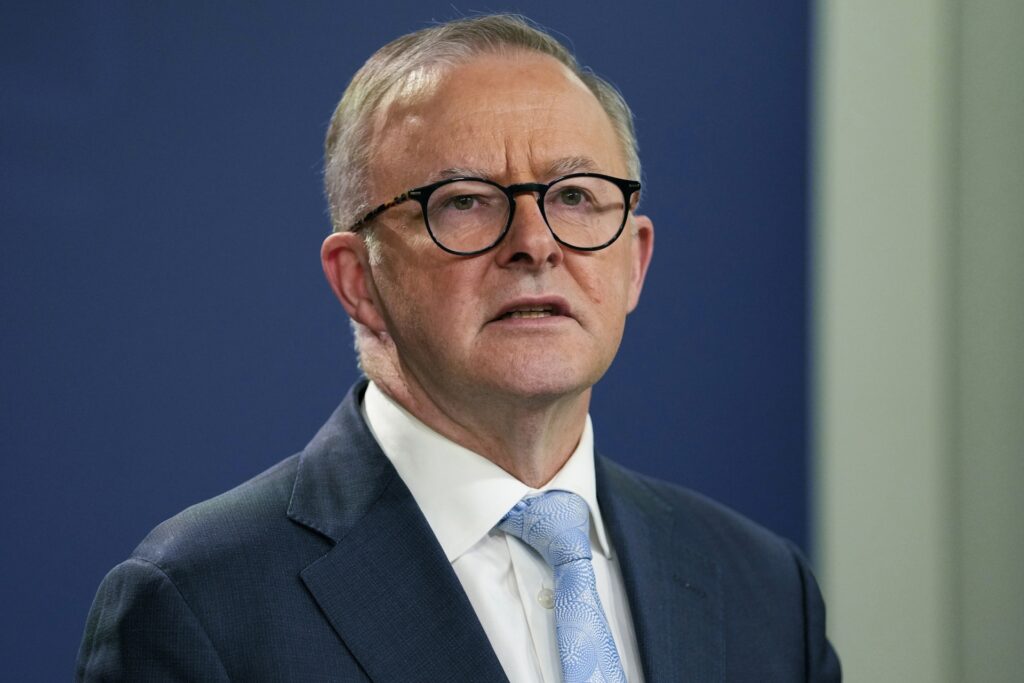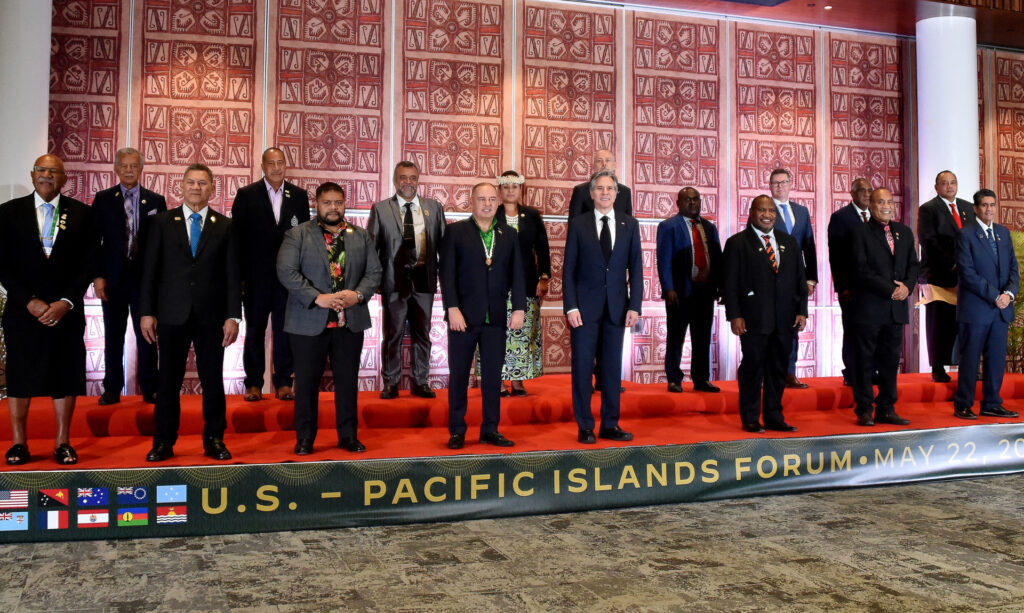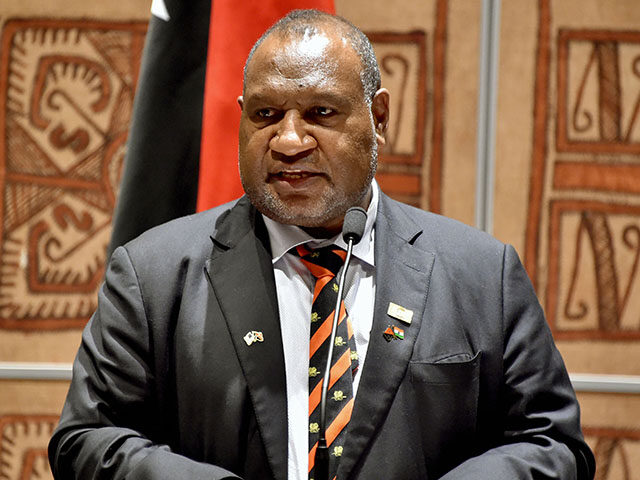Papua New Guinea (PNG) Prime Minister James Marape said on Tuesday that a security treaty with Australia has been delayed due to “certain wordings and provisions.”
The bilateral treaty was described by Marape’s government as a “work in progress” that “requires the PNG side to consult our domestic processes and sovereign laws.”

President Joe Biden poses for photos with Pacific Island leaders including Solomon Islands Prime Minister Manasseh Sogavare, center, and Papua New Guinea Prime Minister James Marape on the North Portico of the White House in Washington, September 29, 2022. On Wednesday, May 17, Biden canceled a visit to Papua New Guinea planned for May 22 to focus on debt limit talks at home, disappointing many in the Pacific Island nation. (AP Photo/Susan Walsh)
The prime minister’s office said he informed Australian Deputy Prime Minister and Defense Minister Richard Marles of the delay when both attended the Pacific Islands Summit in Seoul, South Korea, on Monday.
Marape reportedly asked Marles to “convey his apologies” to Australian Prime Minister Anthony Albanese for the delay in signing the treaty, which was supposed to have been finalized by the end of April and signed in June.

Australian Prime Minister Anthony Albanese speaks during a press conference in Sydney, Australia, Friday, June 10, 2022. (AP Photo/Mark Baker)
Marape said PNG does not wish to “compromise its excellent existing bilateral relations with Australia.” Marles responded by downplaying the delay and touting the “proud history of working together in the interests of the region” shared by the two countries.
Reuters noted on Tuesday that nearby Australia is the largest donor of aid to PNG and it was Marape’s government that first suggested enhancing their bilateral defense agreement. Marles obliged by laying out what he described as an “ambitious” vision of naval, air, and ground forces from both countries training and operating more closely together.
Many outside observers suspected the sudden and ambiguous delay in signing the defense treaty was a result of student protests that broke out across PNG after President Joe Biden canceled his planned visit to the island nation, sending Secretary of State Antony Blinken in his place to sign a U.S.-PNG defense agreement.

Papua New Guinea’s Prime Minister James Marape (front 3rd R), US Secretary of State Antony Blinken (front C), leaders from Pacific Islands and representatives from New Zealand and Australia pose for photos during the US-Pacific Islands Forum at the APEC Haus in Port Moresby on May 22, 2023. (ANDREW KUTAN/AFP via Getty Images)
Protesters said the PNG government was not sufficiently transparent about the details of its agreement with the United States. Some feared PNG could be drawn into a conflict between the U.S. and China, possibly after a Chinese attack on Taiwan.
“If such an agreement is going to affect us in any way, we have to be made aware. An agreement of this magnitude must go before parliament. There must be clarity. The people must be made aware of the implications,” student leader Kenzie Walipi said during the protests on May 22.
The delay in the Australia-PNG security agreement came at a somewhat awkward moment for Australian Prime Minister Anthony Albanese, who is scheduled to deliver the keynote address at the Shangri-La Dialogue security forum in Shanghai on Friday.
Albanese said on Tuesday he plans to use that address to “outline Australia’s vision for a stable, peaceful and prosperous Indo-Pacific.”
“Australia is committed to expanding and deepening ties with our partners in Southeast Asia to address shared challenges and ambitions,” he said.
Sensing a political opportunity, the Russian Foreign Ministry slammed the U.S.-PNG defense pact on Tuesday as “another step forward toward militarizing the Asia-Pacific region, escalating military tensions and dragging Port Moresby into Washington’s geopolitical games aimed against Russia and China.”
“Despite official claims that the PNG territory will not be used as a launchpad for wars, the contents of the agreement provide evidence to the contrary. Washington’s ultimate goal is clearly of a neo-colonial nature. It is to turn the largest South Pacific island nation into an outpost for projecting its military power in the Asia-Pacific region,” said Russian Foreign Ministry spokeswoman Maria Zakharova.

COMMENTS
Please let us know if you're having issues with commenting.